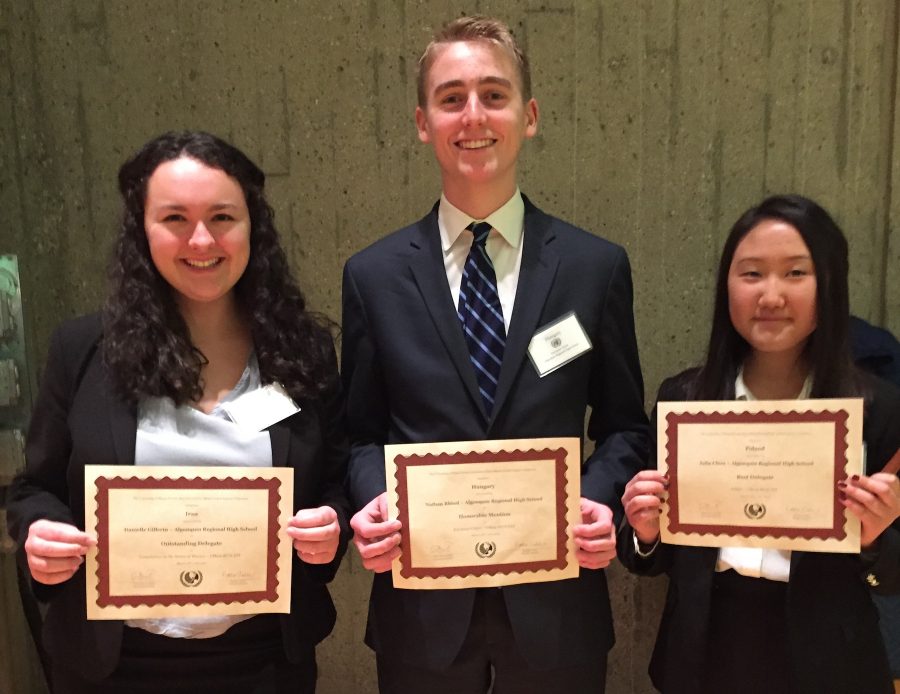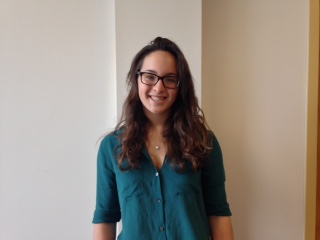Model UN debates to success at UMass conference
Senior Danielle Gillerin, sophomore Nathan Rhind, and junior Julia Chun won awards for their collaboration and debate skills during the Model UN conference at UMass on March 12.
March 14, 2017
The Model United Nations (UN) club competed at a conference at the University of Massachusetts- Amherst (UMass) from March 10 to March 12.
Over the weekend, delegates of Model UN earned recognition within their respective committees, with sophomore Nathan Rhind receiving Honorable Mention (akin to third place), senior Danielle Gillerin earning Outstanding Delegate (akin to second place), and junior Julia Chun winning Best Delegate (akin to first place).
“It was such an honor to receive Best Delegate and I couldn’t have done it without [Model UN club advisors] Ms. [Michelle] Rehill and Ms. [Kimberly] Honey and the club as a whole was really supportive,” Chun said, who represented Poland for the DISEC committee concerning non-proliferation and weapons of mass destruction.
Model UN is designed to simulate the framework of the real United Nations, which serves as an international body of 193 countries promoting global cooperation in regards to major issues such as human rights. Prior to the conference, Model UN members were sent country assignments as well as the committee or general assembly they will be presenting in so they can research their topics.
“I was representing Hungary and I was on the committee for the European Union [EU] so basically all the member countries of the EU were gathered,” Rhind said. “We were discussing the refugee crisis and Hungary had the opinion of isolation as a main priority. What’s hard about it is you have to align with your country’s views even if they’re different from your own.”
At the conference, the event commenced with an opening ceremony comprised of speakers welcoming all the delegates in attendance. The distinguished speaker of the UMass conference was Sonya Atalay, who discussed her experience and research in the fields of anthropology and indigenous studies. The chairs, who manage the debates, were also introduced.
Following the ceremony, delegates then dispersed to their respective committees where country representatives must collaborate, debate, and write a resolution on their respective topic.
“The ultimate goal of all this debate and discussion is to write a resolution,” Gillerin said. “The way resolutions are formatted is the way a real UN resolution is, and [resolutions] have sponsors and signatories. So you have to have a certain number of signatories and sponsors in order for your resolution to be presented to the committee. In most committees, there will be multiple resolutions that are presented and multiple resolutions can pass too.”
Awards are bestowed by committee chairs, who search for members manifesting prowess in regards to how they debate or represent their country on a certain issue or if they contributed to the writing of a resolution.
“I think all of the Algonquin Model UN members worked hard to prepare for this and everyone did a great job,” Gillerin said.
Model UN offers student delegates the opportunity to learn more about the world as well as improve skills which help them in school, such as public speaking.
“[Model UN] really helps you grow as a student and as a citizen in America, and it let’s you voice your opinions and also learn about other nations,” Chun said.
“I was very proud about how Algoqnuin represented itself,” Rhind said. “It’s a beacon of hope for the rest of the world that a bunch of high schoolers can gather around and find resolutions to real world problems.”










